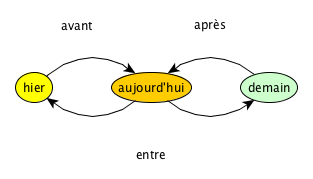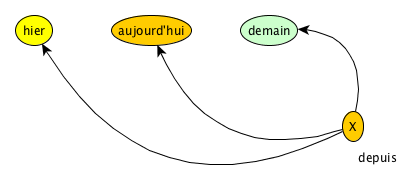As in the case of nouns and verbs, a reasonable number of adjectives in French have a similar form and meaning as their English counterparts, and provide a valuable bootstrapping mechanism in interpreting a text. Here is a list of the most frequent forms where French and English words are identical. Mouse over the list to check the English cognates.
"a priori",
"abbatial",
"abdominal",
"absent",
"abyssal",
"accessible",
"ad hoc",
"adaptable",
"adjacent",
"admirable",
"adorable",
"adverbial",
"adverse",
"affable",
"agile",
"alluvial",
"ambivalent",
"amoral",
"ample",
"anal",
"ancestral",
"anglophile",
"angora",
"animal",
"antique",
"apparent",
"applicable",
"arable",
"architectural",
"ardent",
"arrogant",
"assimilable",
"astral",
"astringent",
"auburn",
"audible",
"axial",
"azuré",
"baptismal",
"baroque",
"beige",
"bestial",
"blasé",
"blond",
"branchial",
"brave",
"brutal",
"burlesque",
"cadastral",
"calculable",
"cantonal",
"capable",
"cardinal",
"caudal",
"causal",
"centigrade",
"central",
"certain",
"cervical",
"charitable",
"chaste",
"choral",
"civil",
"coaxial",
"colonial",
"colossal",
"combustible",
"commensurable",
"commercial",
"communicable",
"compact",
"comparable",
"compatible",
"compressible",
"concave",
"concomitant",
"conjugal",
"consonant",
"constant",
"consultant",
"continent",
"continental",
"contingent",
"convalescent",
"convergent",
"convertible",
"correct",
"costal",
"crucial",
"cruel",
"cultivable",
"curable",
"curule",
"dantesque",
"dense",
"dental",
"dialectal",
"dictatorial",
"digestible",
"digital",
"digitigrade",
"dilatable",
"diligent",
"direct",
"disco",
"dissident",
"distant",
"distinct",
"divergent",
"divisible",
"docile",
"doctoral",
"doctrinal",
"dominant",
"dorsal",
"double",
"dry",
"ducal",
"ductile",
"effervescent",
"efflorescent",
"enviable",
"excellent",
"excitable",
"excusable",
"exempt",
"exorbitant",
"expert",
"explicable",
"exploitable",
"explosible",
"exportable",
"express",
"extensible",
"extra",
"extravagant",
"facial",
"fatal",
"fertile",
"fervent",
"filial",
"final",
"fiscal",
"fissile",
"flambé",
"flexible",
"floral",
"fluorescent",
"focal",
"folk",
"fragile",
"frontal",
"frugal",
"fusible",
"futile",
"gastronomique",
"gay",
"grammatical",
"grotesque",
"guttural",
"hermaphrodite",
"hexagonal",
"hi-fi",
"hippie",
"honorable",
"horizontal",
"hormonal",
"horrible",
"hostile",
"humble",
"humoral",
"identifiable",
"ignorant",
"imaginable",
"imitable",
"immanent",
"immature",
"imminent",
"immoral",
"impalpable",
"impartial",
"impatient",
"imperceptible",
"implacable",
"important",
"impossible",
"imprescriptible",
"impromptu",
"impudent",
"inaccessible",
"inapplicable",
"inaudible",
"inaugural",
"incalculable",
"incandescent",
"incessant",
"incombustible",
"incommunicable",
"incomparable",
"incompatible",
"incompressible",
"inconsolable",
"incontinent",
"inconvertible",
"incorrect",
"incorrigible",
"incorruptible",
"incurable",
"indestructible",
"indigo",
"indirect",
"indispensable",
"indissociable",
"indissoluble",
"indistinct",
"indivisible",
"indolent",
"indubitable",
"indulgent",
"inexorable",
"inexpiable",
"inexplicable",
"inextricable",
"infantile",
"infernal",
"infertile",
"inflexible",
"inguinal",
"inimitable",
"initial",
"injectable",
"innocent",
"inquisitorial",
"insane",
"insatiable",
"insolent",
"insoluble",
"instrumental",
"intact",
"intangible",
"intelligent",
"intelligible",
"intense",
"interchangeable",
"intercontinental",
"intercostal",
"international",
"intestinal",
"invariable",
"invincible",
"inviolable",
"invisible",
"ipso facto",
"irritable",
"junior",
"justifiable",
"kitsch",
"labial",
"lamé",
"latent",
"lexical",
"local",
"long",
"longitudinal",
"luminescent",
"lustral",
"macabre",
"marginal",
"marital",
"maritime",
"martial",
"mauve",
"maximal",
"maximum",
"mental",
"militant",
"minimum",
"mobile",
"modal",
"mohair",
"monochrome",
"monumental",
"moral",
"multinational",
"multiple",
"municipal",
"munificent",
"musical",
"mutant",
"nasal",
"national",
"naval",
"navigable",
"noble",
"nominal",
"nonchalant",
"normal",
"nubile",
"oblique",
"oblong",
"observable",
"occipital",
"officinal",
"ogival",
"omnipotent",
"omniscient",
"opaque",
"opposable",
"optimum",
"opulent",
"oral",
"orange",
"orbital",
"orchestral",
"ordinal",
"oriental",
"original",
"out",
"p.m.",
"palpable",
"papable",
"papal",
"parental",
"participial",
"partisan",
"pastoral",
"patient",
"patrimonial",
"patronal",
"payable",
"pectoral",
"perceptible",
"perfectible",
"permanent",
"pertinent",
"phosphorescent",
"picaresque",
"plantigrade",
"plausible",
"pleural",
"pluvial",
"polygonal",
"polyvalent",
"pop",
"porno",
"portable",
"possible",
"postal",
"primatial",
"profitable",
"proverbial",
"provincial",
"psychotechnique",
"public",
"punk",
"purulent",
"putrescible",
"pyramidal",
"quadriennal",
"quadruple",
"racial",
"radial",
"radiant",
"radical",
"raglan",
"rare",
"rechargeable",
"recrudescent",
"rectifiable",
"reflex",
"regrettable",
"repentant",
"respectable",
"rococo",
"rosé",
"rural",
"scout",
"sculptural",
"second",
"secret",
"seigneurial",
"senior",
"sentimental",
"septuple",
"servile",
"simple",
"sociable",
"social",
"soluble",
"sororal",
"soufflé",
"spatial",
"spectral",
"spinal",
"stable",
"stagnant",
"standard",
"sterling",
"stimulant",
"strict",
"strident",
"structural",
"sublime",
"submersible",
"succinct",
"succulent",
"sui generis",
"synovial",
"tactile",
"tangent",
"tangible",
"tartare",
"temporal",
"territorial",
"textile",
"thermal",
"tonal",
"tory",
"total",
"transcontinental",
"transmissible",
"transparent",
"transportable",
"traversable",
"tribal",
"tripartite",
"triple",
"tropical",
"ultraviolet",
"urgent",
"vacant",
"vaginal",
"vague",
"vain",
"variable",
"vassal",
"ventral",
"verbal",
"vertical",
"viable",
"vibrant",
"vigilant",
"viking",
"violent",
"viral",
"virginal",
"virulent",
"visible",
"vital",
"vocal",
"yankee",
"yé-yé",
"zen"
There are also many cases where the two languages differ only by a bit and where, once vowels are removed, the two are the same. The following table shows some of the systematic relations between the two.
And here is a list of some close cognates. Again, mouse over these to become familiar with them.
"absolutiste",
"absorbant",
"absurde",
"acadien",
"accidentel",
"achéménide",
"actuariel",
"adulte",
"africain",
"aisé",
"alerte",
"algérien",
"alpin",
"ambré",
"américain",
"amputé",
"ancillaire",
"anglican",
"angulaire",
"animiste",
"annuel",
"antédiluvien",
"antérieur",
"anthropoïde",
"anticlérical",
"anticolonialiste",
"anticommuniste",
"antifasciste",
"antimilitariste",
"antiraciste",
"aphteuse",
"applicateur",
"appréciable",
"approchable",
"arbitraire",
"archiépiscopal",
"aride",
"artériel",
"artificiel",
"aryen",
"atrabilaire",
"auguste",
"austère",
"automnal",
"auxiliaire",
"avunculaire",
"bacillaire",
"bai",
"belligérant",
"bénéficiaire",
"béotien",
"biennal",
"bilatéral",
"biliaire",
"binaire",
"binoculaire",
"bipolaire",
"bleu",
"bluffeur",
"bohémien",
"bovin",
"brillant",
"budgétaire",
"calme",
"canin",
"capillaire",
"capitaliste",
"capitulaire",
"carminé",
"caténaire",
"cellulaire",
"centésimal",
"centriste",
"céramiste",
"cérébral",
"cérébro-spinal",
"circulaire",
"clair",
"clandestin",
"clérical",
"cohérent",
"coïncident",
"collatéral",
"collectiviste",
"colloïdal",
"colonialiste",
"comédien",
"commun",
"communiste",
"compensateur",
"compétent",
"complémentaire",
"complet",
"complexe",
"complimenteur",
"compréhensible",
"concevable",
"conciliaire",
"concis",
"concret",
"confidentiel",
"conformiste",
"congénital",
"conséquent",
"constituant",
"consubstantiel",
"consulaire",
"contractuel",
"contradictoire",
"contrasté",
"contrefait",
"contrit",
"conventuel",
"convexe",
"coronaire",
"corpusculaire",
"courtois",
"crasse",
"crédible",
"crématoire",
"crépusculaire",
"criminel",
"cristallophyllien",
"cryptocommuniste",
"cryptogame",
"cubiste",
"culinaire",
"culturel",
"cunéiforme",
"décadent",
"décent",
"décimal",
"déclamatoire",
"déclinable",
"décomposable",
"déductible",
"défaitiste",
"déficient",
"délicat",
"délinquant",
"deltoïde",
"déodorant",
"départemental",
"dépendant",
"dépilatoire",
"déplorable",
"déponent",
"dérisoire",
"désinfectant",
"désirable",
"détachable",
"détergent",
"déterministe",
"dévot",
"différent",
"différentiel",
"diffus",
"diluvien",
"diocésain",
"dirigeable",
"discernable",
"disciplinaire",
"discourtois",
"discret",
"discriminatoire",
"divin",
"divinatoire",
"documentaire",
"dodécaphoniste",
"domiciliaire",
"draconien",
"duodécimal",
"duodénal",
"égyptien",
"électoral",
"électronique",
"élégant",
"élémentaire",
"éligible",
"éliminatoire",
"élitiste",
"ellipsoïde",
"éloquent",
"éolien",
"épicurien",
"épiscopal",
"épistolaire",
"épithélial",
"équatorial",
"équidistant",
"équilatéral",
"équivalent",
"érectile",
"érudit",
"essentiel",
"esthète",
"éternel",
"euclidien",
"eurasien",
"européen",
"évanescent",
"excréteur",
"exécutable",
"exemplaire",
"existentialiste",
"expédient",
"expérimental",
"expiatoire",
"explicite",
"exponentiel",
"extra-fin",
"extraordinaire",
"extraverti",
"extrême",
"extrémiste",
"extroverti",
"exubérant",
"factoriel",
"faisable",
"familier",
"fasciste",
"favorable",
"fébrifuge",
"fécal",
"féculent",
"fédéral",
"fédéraliste",
"félin",
"féminin",
"féministe",
"fémoral",
"féodal",
"ferme",
"fétide",
"fin",
"fluide",
"foetal",
"fondamental",
"formel",
"fossile",
"fraternel",
"frêle",
"fréquent",
"frigide",
"futur",
"gouvernable",
"gouvernemental",
"graduel",
"gravide",
"halogène",
"héréditaire",
"hésitant",
"hétérodoxe",
"hétérosexuel",
"hexapode",
"hippy",
"homosexuel",
"honoraire",
"humain",
"humanitaire",
"humide",
"hybride",
"idéal",
"illégal",
"illicite",
"illusoire",
"imaginaire",
"immatériel",
"immédiat",
"immortel",
"impénétrable",
"impérial",
"impérialiste",
"implicite",
"impondérable",
"impressioniste",
"impur",
"inacceptable",
"inadéquat",
"inaliénable",
"inca",
"incertain",
"inclément",
"incohérent",
"incompétent",
"incomplet",
"incompréhensible",
"inconcevable",
"indécent",
"indélébile",
"indéniable",
"indépendant",
"indésirable",
"indicateur",
"indien",
"indifférent",
"indiscernable",
"indiscret",
"individualiste",
"individuel",
"indo-européen",
"indochinois",
"indonésien",
"industriel",
"inélégant",
"inéligible",
"inepte",
"inexploitable",
"infaillible",
"inférieur",
"ingouvernable",
"inhérent",
"inhumain",
"inimaginable",
"inintelligent",
"inintelligible",
"injustifiable",
"inopérable",
"inséparable",
"insipide",
"insistant",
"insociable",
"instable",
"insulaire",
"intellectuel",
"intercalaire",
"interdépendant",
"interministériel",
"internationaliste",
"interplanétaire",
"intersidéral",
"interstellaire",
"intestat",
"intolérable",
"intolérant",
"intouchable",
"intramusculaire",
"intransigeant",
"inuit",
"invalide",
"invérifiable",
"invulnérable",
"iranien",
"irréconciliable",
"irréfragable",
"irréparable",
"irrépressible",
"irréprochable",
"irrésistible",
"irresponsable",
"irréversible",
"irrévocable",
"italien",
"jugulaire",
"justificateur",
"languide",
"latéral",
"légal",
"légendaire",
"libéral",
"libertin",
"lige",
"limpide",
"linéaire",
"liquéfiable",
"liquide",
"lombaire",
"lucide",
"lunaire",
"majeur",
"malléable",
"mammaire",
"manoeuvrable",
"manuel",
"marginaliste",
"marin",
"masculin",
"masticateur",
"matériel",
"maternel",
"médian",
"médical",
"médicinal",
"médiéval",
"médiocre",
"médullaire",
"mémorable",
"menstruel",
"mercenaire",
"méridien",
"mesurable",
"météo",
"métropolitain",
"migrateur",
"migratoire",
"militaire",
"minéral",
"mineur",
"miniaturé",
"ministériel",
"moderne",
"modeste",
"modificateur",
"moléculaire",
"monarchiste",
"mondain",
"monétaire",
"mononucléaire",
"monothéiste",
"morbide",
"moussu",
"muet",
"multilatéral",
"musculaire",
"mutuel",
"naturaliste",
"naturel",
"naturiste",
"nécessaire",
"néo-libéral",
"néo-réaliste",
"neutraliste",
"nobiliaire",
"non euclidien",
"nucléaire",
"nudiste",
"numéral",
"obèse",
"obscène",
"obsolète",
"obtus",
"océanien",
"octogonal",
"oculaire",
"officiel",
"olympien",
"ombilical",
"omniprésent",
"ondulatoire",
"opalin",
"opérable",
"orangé",
"ordinaire",
"originel",
"ornemental",
"orthodoxe",
"ostrogoth",
"ottoman",
"ovale",
"ovarien",
"ovin",
"ovulaire",
"pacifiste",
"pâle",
"parallèle",
"paramédical",
"paramilitaire",
"pariétal",
"parlementaire",
"particulier",
"partiel",
"paternel",
"patricien",
"pendulaire",
"pénétrable",
"péninsulaire",
"péremptoire",
"perméable",
"perpendiculaire",
"perpétuel",
"persistant",
"phénoménal",
"pictural",
"placide",
"plaisant",
"planétaire",
"plantaire",
"plébéien",
"plébiscitaire",
"plénière",
"plénipotentiaire",
"pluraliste",
"pointilliste",
"polaire",
"ponctuel",
"pondérable",
"populaire",
"populiste",
"porcin",
"positiviste",
"potentiel",
"prédominant",
"préfectoral",
"préférable",
"préférentiel",
"préhensile",
"préliminaire",
"prémonitoire",
"préparatoire",
"présent",
"présentable",
"présidentiel",
"toge prétexte",
"prétorien",
"primaire",
"proéminent",
"professoral",
"profus",
"prolétarien",
"propitiatoire",
"providentiel",
"psychomoteur",
"puerpéral",
"pulmonaire",
"pulvérulent",
"pur",
"purificatoire",
"puriste",
"putride",
"putschiste",
"raciste",
"rapide",
"rationaliste",
"réaliste",
"récalcitrant",
"récent",
"rectangulaire",
"redondant",
"réel",
"réformable",
"réfractaire",
"réfugié",
"régicide",
"régionaliste",
"régulier",
"rénal",
"réparable",
"répréhensible",
"républicain",
"résidentiel",
"résiduel",
"respiratoire",
"responsable",
"réticent",
"rétractile",
"rétro",
"rétrograde",
"révérend",
"réversible",
"révocable",
"riche",
"rigoriste",
"rituel",
"rogatoire",
"rond",
"royaliste",
"rubicond",
"rudimentaire",
"sacramentel",
"sanitaire",
"satiné",
"sauf",
"scalaire",
"sécant",
"secondaire",
"sectoriel",
"séculaire",
"sédentaire",
"sédimentaire",
"sélect",
"séminal",
"sénatorial",
"sénile",
"sensuel",
"séparable",
"serein",
"sériel",
"sexiste",
"sexuel",
"siamois",
"sibyllin",
"sidéral",
"similaire",
"sincère",
"singulier",
"sinistre",
"sinusoïdal",
"socialiste",
"solaire",
"solide",
"solitaire",
"sommaire",
"sordide",
"spécial",
"spectaculaire",
"spiritualiste",
"spirituel",
"statutaire",
"stellaire",
"stéréo",
"stérile",
"sternutatoire",
"structuraliste",
"structurel",
"stupide",
"subséquent",
"subsidiaire",
"substantiel",
"subtil",
"suburbain",
"superficiel",
"suprême",
"sur",
"surmontable",
"surréaliste",
"symboliste",
"tabou",
"tabulaire",
"tachiste",
"taciturne",
"tangentiel",
"temporaire",
"temporel",
"tendre",
"ténor",
"térébrant",
"ternaire",
"terroriste",
"tertiaire",
"thermonucléaire",
"thyroïde",
"timide",
"tolérable",
"tolérant",
"torrentiel",
"torride",
"traditionaliste",
"transalpin",
"transformiste",
"transsexuel",
"triangulaire",
"triomphant",
"tsariste",
"tubulaire",
"ukrainien",
"ultramoderne",
"ultramontain",
"unicellulaire",
"uniforme",
"unilatéral",
"unisexe",
"urbain",
"urinaire",
"utérin",
"vanillé",
"vasculaire",
"vasomoteur",
"vaste",
"vaudou",
"vectoriel",
"végétarien",
"vélaire",
"vénal",
"vénérable",
"véniel",
"ventriculaire",
"vérifiable",
"vermiculaire",
"vernaculaire",
"vertébral",
"vésical",
"vétérinaire",
"vibratoire",
"vidéo",
"virtuel",
"virtuose",
"viscéral",
"visuel",
"vitellin",
"volatil",
"voltairien",
"volubile",
"vulnérable",
"yiddish",
"yougoslave"
However, it is also important to recognize cases of false friends among adjectives, where the meaning of the French adjective is not the same as its counterpart in English. Here are some of the most frequent cases:




